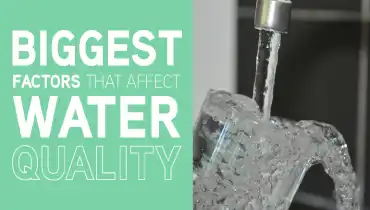The Key Factors that Affect Water Quality

Typically, homeowners don't have to worry about tap water quality, as most cities have filtration systems that ensure water meets minimum quality standards. However, there's always a minor risk of water contamination, so it's important to know which factors influence water quality in your home.
We'll explain the key factors that impact water quality, give you some tips for improving water quality, and discuss the most common water quality issue, hard water:
- The Key Factors that Affect Water Quality
- How to Improve Water Quality in Your Home
- Hard Water
The Key Factors that Affect Water Quality
Several factors influence water quality. Some of them involve human interference, while others stem from environmental causes. The most notable factors affecting your water include:
- Sedimentation
- Runoff
- Erosion
- Dissolved oxygen
- pH
- Temperature
- Pesticides
- Detergents
- Litter/garbage
- Oil/grease
- Household cleaners
- Population growth
Safe water isn't just important for your health - it's better for your appliances. Softened and filtered water can improve the efficiency of your washing machine and dishwasher, saving you money and improving your appliances' lifespan.
How to Improve Water Quality in Your Home
Adding a water filter to your home can make your water safer and better tasting. Filters fall into one of two categories: point-of-entry and point-of-use. Here's a quick overview of how each works:
- Point-of-entry: These filtration systems filter water as it enters your home's plumbing system. They must be professionally installed and are a higher cost than point-of-use systems are. These units purify water throughout the entire home. Some common examples of point-of-entry filtration systems include water softeners, which remove concentrations of minerals, and aerators, which use air jets to purify water.
- Point-of-use: As the name implies, point-of-use filtration systems filter water as it exits the fixture for use. They tend to be cheaper, and some can even be installed by homeowners. Common examples of point-of-use filters include distillers and reverse osmosis units.
If you are mainly concerned about the quality of your drinking water, rather than other water sources throughout your home, consider a filtered pitcher. These handy devices purify water poured into its reservoir and can be stored in the fridge to keep the water cold all the time.
Hard Water
What is the most common water quality issue in homes? Hard water. Fortunately, hard water doesn't pose severe health risks. That said, hard water can lead to severe plumbing problems and other issues if left unaddressed.
Hard water is water with an overabundance of calcium salts. The main issue hard water causes is calcium buildup. This buildup usually presents as an unsightly white stain on sink basins and faucets. Exceptionally hard water can cause clogs if it isn't softened.
Hard water also has consequences for your appliances. These calcium salts can build up in your washing machine, wearing out your clothes, and gumming up the machine's internal components. Over time, this reduces the lifespan of your appliance and your clothes. Adding a point-of-entry water softener to your home is the best way to deal with hard water problems.
Call Mr. Rooter for Whole Home Water Quality Improvement Services
Drinking plenty of water is key to staying healthy, but if your water isn't safe and clean, it will do you more harm than good. Contact your local Mr. Rooter Plumbing to learn about filtration options available in your area.
 Click to call
Click to call


